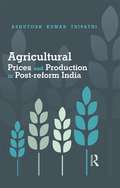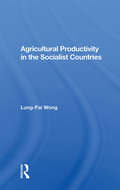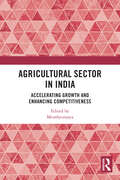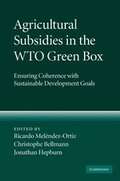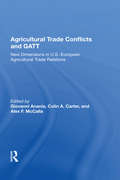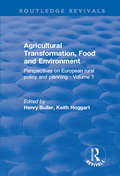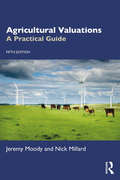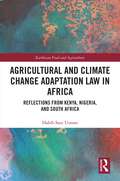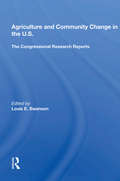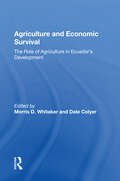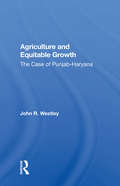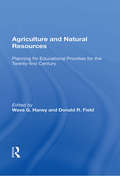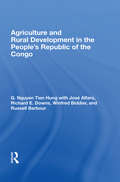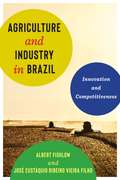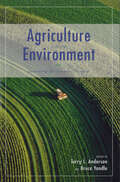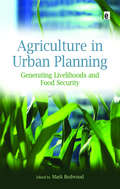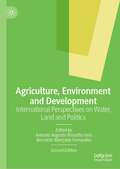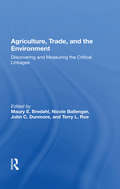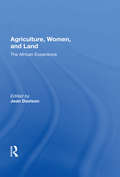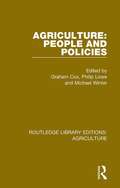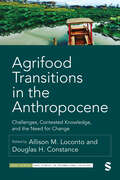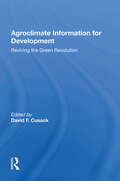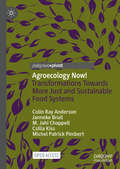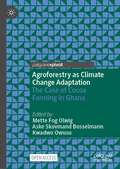- Table View
- List View
Agricultural Prices and Production in Post-reform India: An Inquiry Into The Post-reform Period
by Ashutosh Kumar TripathiPost-reform India has seen a decline in agricultural growth as well as supply–demand imbalance and rising prices. This book presents a comprehensive analysis of domestic and international prices and trade since 1980–81, covering the past quarter of a century. Backed with rich data, it provides comparisons between the pre- and post-liberalisation policies and their effect on farm profitability, domestic prices and prices variability, and examines their possible role in determining the trajectory of agricultural growth since 1991. The book will appeal to students, scholars and researchers of agriculture studies, economics, finance, and development studies, as well as policy makers and agriculture experts.
Agricultural Productivity In The Socialist Countries
by Lung-fai WongWith the emergence of collectivization, the communal movement, and the food crisis, the development of agriculture in socialist countries has become a topic of great interest to economists. Focusing on productive efficiency, Dr. Wong estimates an agricultural metaproduction function for nine countries--China, Bulgaria, Czechoslovakia, East Germany, Hungary, Poland, Romania, Yugoslavia, and the Soviet Union--and computes both the partial productivities and total productivity in comparable units. Using the growth accounting procedure, the author performs a quantitative comparative analysis of the differences and the sources of differences in agricultural productivity among socialist countries. Methods of analyzing productivity measures are described, revealing the contribution of land, labor, education, and other factors in agricultural growth. Dr. Wong concludes by discussing the policy implications for development strategy and the effects on the world food market.
Agricultural Sector in India: Accelerating Growth and Enhancing Competitiveness
by MruthyunjayaThis book presents a comprehensive overview of a range of concepts, methods, strategies and policies in agriculture and natural resource management, environmental economics, production economics and sustainable agricultural development. It explores effective analytical tools and science, innovations, and management solutions to enhance yields, manage the supply chain, strengthen institutional mechanisms, and service and support systems for farmers. It highlights the importance of enabling policies which can benefit farmers, resulting in cost-efficient and quality-improving farm practices, increased profits and income for farmers, and better management of natural resources. The essays in the book honour the academic, teaching, and research contributions of Professor R. Ramanna in the field of agricultural economics. They also address issues which are relevant to the growing research in sustainable agricultural development and natural resource management including the use of new concepts, tools, analyses, technologies, innovations, and policy strategies modelled in local contexts that can easily be scaled and applied to similar contexts elsewhere. This book will be of interest and use to students, researchers, practitioners,and policymakers working in varied fields of agricultural economics, sustainable development, public policy, rural sociology, political economy, economics of innovation, institutional economics, and industrial organisation.
Agricultural Subsidies in the WTO Green Box: Ensuring Coherence with Sustainable Development Goals
by Ricardo Meléndez-Ortiz Christophe Bellmann Jonathan HepburnDo the World Trade Organization's rules on 'green box' farm subsidies allow both rich and poor countries to achieve important goals such as food security, or do they worsen poverty, distort trade and harm the environment? Current WTO requirements set no ceiling on the amount of green box subsidies that governments can provide, on the basis that these payments cause only minimal trade distortion. Governments are thus increasingly shifting their subsidy spending into this category, as they come under pressure to reduce subsidies that are more directly linked to production. However, growing evidence nonetheless suggests that green box payments can affect production and trade, harm farmers in developing countries and cause environmental damage. By bringing together new research and critical thinking, this book examines the relationship between green box subsidies and the achievement of sustainable development goals, and explores options for future reform.
Agricultural Trade Conflicts And Gatt: New Dimensions In U.s.-european Agricultural Trade Relations
by Giovanni AnaniaAgricultural trade, always a source of international friction, will remain a contentious issue in the years to come. The GATT agreement achieved only partial trade liberalization; recognizing this, the agreement calls for a continuation of the negotiation process to achieve the long-run goal of a “substantial reduction in agricultural support and protection.†In any case, it is clear that U.S.-European Union (EU) agricultural trade relations will remain central to any future negotiation. In this volume, leading experts present a comprehensive set of analyses of the U.S.-EU agricultural trade conflict. The discussions provide a unique perspective on the U.S.-EU agricultural trade confrontation in recent years and offer insights into both the final GATT agreement and forthcoming agricultural issues. Presenting a broad historical context, the book focuses on changes in U.S. and European trade and agricultural policies, looking at the implications of these changes for bilateral relations and global agricultural markets. Providing U.S., EU, and third-party perspectives, the contributors analyze the negotiation process in the Uruguay Round of the GATT. Finally, the book explores several additional dimensions of the U.S.-EU agricultural trade conflict, including the consequences of the EU integration and enlargement processes, the environmental impact of the Union’s agricultural policies, and the mechanisms and forces that determine agricultural policy formation in both the United States and in Europe.
Agricultural Transformation, Food and Environment: Perspectives on European Rural Policy and Planning - Volume 1 (Routledge Revivals)
by Keith Hoggart Henry BullerThis title was first published in 2001. An interdisciplinary team of leading European scholars bring together case studies from Western and Eastern Europe to illustrate and critically analyze the shifting relationships of agricultural, environmental and food policy in Europe. In the most comprehensive book of its kind it examines the critical changes, both in agricultural, environmental and food politics and the way these domains have been investigated by European social scientists. The book evaluates specific changes, focussing in particular on agricultural restructuring (in the face of globalization, Europeanization and the collapse of the Soviet model of agricultural organization), agriculture-environmental relations and consumer preferences. Beginning by examining the degree to which Europe offers a unique and identifiable rural experience, the book includes a critical re-examination of the process of agricultural transformation. In the light of contemporary events and the over-seductive and essentially mythical notion of post-productivism.
Agricultural Valuations: A Practical Guide
by Jeremy Moody Nick MillardAgricultural Valuations: A Practical Guide has long been the standard text for students and professionals working on agricultural valuations. Taking a practical approach, it covers all the relevant techniques and legislation necessary to correctly value farms, assess farm rents, carry out arbitrations, inventories and records of condition, including valuation clauses on sales of farms, livestock, soils, management agreements, valuation in court proceedings and a glossary of useful information. In this fifth edition, Gwyn Williams's original text is taken on by Jeremy Moody and Nick Millard, renowned experts in the field, bringing the book right up to date to reflect recent changes in the rural economy, including development, diversification and renewable energy and specialist valuations and reference to all the latest legislation. Clear and accessible to students and professionals alike, readers will find Agricultural Valuations an invaluable guide to best practice in agricultural valuations.
Agricultural and Climate Change Adaptation Law in Africa: Reflections from Kenya, Nigeria, and South Africa (Earthscan Food and Agriculture)
by Habib Sani UsmanThis book presents an analysis of climate change and agricultural laws in Kenya, Nigeria, and South Africa in order to determine whether they adequately addressed the concept of agricultural adaptation.Agriculture is one of the sectors of the economy that is contributing to climate change, and at the same time the sector is heavily impacted by climate change. Therefore agricultural adaptation is required. Focusing on three countries, this book provides a novel, comparative examination of how and to what extent the law promotes agriculture-focused adaptation in these countries. The role of the law in addressing issues such as water management strategies, soil conservation methods, and crop production methods is discussed. This book identifies gaps in the regulatory frameworks for agricultural adaptation and highlights the lack of adaptive capacity of African agriculture due to weak or non-existing legal frameworks. It discusses ways to remedy these gaps through specific on-farm adaptation strategies, legislative amendments to consolidate all relevant national climate change-related policies and laws with agricultural policies and laws that have relevant provisions on adaptation as medium-term solutions, and the development of a specific framework law for agriculture-focused adaptation, incorporating essential agricultural adaptation strategies, could perhaps be enacted as long-term solutions to the regulatory gaps.This book will be of great interest to students and scholars of law, climate change, food and agriculture, sustainable development, and African studies.
Agriculture And Community Change In The U.s.: The Congressional Research Reports
by Louis E. SwansonThis book contains the Office of Technology Assessment commissioned papers analyzing the Northeast, South, Midwest, the Great Plains and the West of the U.S. The papers indicate that the relationship between the structure of agriculture and characteristics of rural communities vary in the U.S. .
Agriculture And Economic Survival: The Role Of Agriculture In Ecuador's Development
by Morris D WhitakerOriginally published in 1990, in this study the authors have surveyed and anaylsed a large volume of difficult to access or unpublished papers and literature and it organised it into thirteen chapters. Subjects covered include introductory and concluding essays, development policy, agricultural performance, natural resources, the labor market, production, irrigation, marketing and credit of Ecuador's agricultural sector.
Agriculture And Equitable Growth: The Case Of Punjab-haryana
by John R. WestleyThis book aims to examine how the pattern of growth in the agricultural sectors has contributed to equitable growth and to assess the relevance of the relationship between agriculture and equitable growth in Punjab-Haryana for other states in India and for other low-income countries.
Agriculture And Natural Resources: Planning For Educational Priorities For The Twenty-first Century
by Donald R. Field Wava G. HaneyThis book identifies issues and trends in agriculture, natural resources, and rural communities in the context of topical strategic planning. It portrays both the process of planning and the substantive content driving a planning process. .
Agriculture And Rural Development In The People's Republic Of The Congo
by G. Nguyen HungThis comprehensive study outlines the current transformation in agriculture and its effect on the demography, development, and economy of the People’s Republic of the Congo. G. Nguyen Tien Hung analyzes fundamental structural changes within the economy and the impact of the application of the Marxist model of development upon the performance and gr
Agriculture and Industry in Brazil: Innovation and Competitiveness
by Albert Fishlow José Eustáquio Vieira FilhoAgriculture and Industry in Brazil is a study of the economics of Brazilian agriculture and industry, with a special focus on the importance of innovation to productivity growth. Albert Fishlow and José Eustáquio Ribeiro Vieira Filho examine technological change in Brazil, highlighting the role of public policy in building institutions and creating an innovation-oriented environment.Fishlow and Vieira Filho tackle the theme of innovation from various angles. They contrast the relationship between state involvement and the private sector in key parts of the Brazilian economy and compare agricultural expansion with growth in the oil and aviation sectors. Fishlow and Vieira Filho argue that modern agriculture is a knowledge-intensive industry and its success in Brazil stems from public institution building. They demonstrate how research has played a key role in productivity growth, showing how prudent innovation policies can leverage knowledge not only within a particular company but also across whole sectors of the economy. The book discusses whether and how Brazil can serve as a model for other middle-income countries eager to achieve higher growth and a more egalitarian distribution of income. An important contribution to comparative, international, and development economics, Agriculture and Industry in Brazil shows how the public success in agriculture became a prototype for advance elsewhere.
Agriculture and the Environment: Searching for Greener Pastures
by Terry L. Anderson Bruce YandleAlthough US agriculture is the envy of the world, there is a growing gap between what is and what could be produced. The gap is due in part to a growing morass of environmental regulations, which limit US food production without necessarily improving environmental quality. In this compilation, leading experts examine a range of questions posed by these constraints and offer ideas for reform.Authors explore whether we are really running out of prime farmland; how best to preserve environmentally sensitive land, and for how long; whether controls on agricultural land use can prevent urban sprawl; whether chemicals that contribute to agricultural productivity are harmful to the environment; the connections between genetically modified crops and human health; how taxes affect land use; what role water markets play in balancing agricultural productivity and wildlife habitat; and the effects of the Endangered Species Act on land use.
Agriculture in Urban Planning: Generating Livelihoods and Food Security
by Mark RedwoodThis volume, by graduate researchers working in urban agriculture, examines concrete strategies to integrate city farming into the urban landscape. Drawing on original field work in cities across the rapidly urbanizing global south, the book examines the contribution of urban agriculture and city farming to livelihoods and food security. Case studies cover food production diversification for robust and secure food provision; the socio-economic and agronomic aspects of urban composting; urban agriculture as a viable livelihood strategy; strategies for integrating city farming into urban landscapes; and the complex social-ecological networks of urban agriculture. Other case studies look at public health aspects including the impact of pesticides, micro-biological risks, pollution and water contamination on food production and people. Ultimately the book calls on city farmers, politicians, environmentalists and regulatory bodies to work together to improve the long term sustainability of urban farming as a major, secure source of food and employment for urban populations. Published with IDRC
Agriculture, Environment and Development: International Perspectives on Water, Land and Politics
by Antonio Augusto Rossotto Ioris Bernardo Mançano FernandesThe Second Edition of this book is completely revised and updated throughout providing an overview of current challenges faced within the area of Agri-food in relation to policymaking, ecological conservation and socio-environmental justice. Including a range of new chapters, the book explores some of the conceptual and analytical gaps that are presented by current approaches to this topic. The series of interconnected chapters offers a critical reinterpretation of the tensions associated with the failures of mainstream regulatory regimes, land and resource grabbing, and the impacts of global agri-food chains at local, regional and inter-sectoral scales. The book also examines past legacies and emerging challenges associated with agriculture modernisation, politico-spatial disputes, climate change, social movements, gender, ethnicity and education. It likewise addresses the transformative potential of different combinations of biophysical, socio-technical and socio-spatial practices of food sovereignty.
Agriculture, Trade, And The Environment: Discovering And Measuring The Critical Linkages
by Maury E. Bredahl Nicole Ballenger John C. Dunmore Terry L. RoeIn this timely volume, an international group of economists, trade negotiators, and environmentalists brings diverse perspectives to bear on the contentious issue of international trade and the environment. Providing a conceptual framework to help assess the issues, the contributors discuss three themes: the dimensions of the economic and political
Agriculture, Women, And Land: The African Experience
by Jean DavisonThis book examines gender relations to land relations that are crucial to formulating policies through which African women's food producing capabilities can be advanced. It addresses the need to document historical changes in land tenure practices that have influenced women's household production.
Agriculture: People and Policies (Routledge Library Editions: Agriculture #5)
by Michael Winter Philip Lowe Graham CoxThe structure and future of Britain’s agriculture sector are the central concerns of this volume, first published in 1986. It critically examines the mystique surrounding agriculture which has done much to underpin the special support the industry had enjoyed. The papers collected here address many of the key questions: What is distinctive about the social and economic organisation of agricultural production? What are the main factors which have influenced policy formation? And how are the policy makers likely to respond to widespread concern about the economic and environmental impact of those policies?
Agrifood Transitions in the Anthropocene: Challenges, Contested Knowledge, and the Need for Change (SAGE Studies in International Sociology)
by Douglas H. Constance Allison M. LocontoThe greatest challenges of the twenty-first century stem from the fact that we are now living in a new epoch: the Anthropocene. The human footprint on the planet can no longer be denied. One of the greatest and most essential human innovations, agriculture, is being increasingly recognised as a leading contributor to climate change. According to global governance bodies, the world will need to feed a predicted nine billion people by 2050. However, in this Anthropocene, we must address the environmental inequalities in how these people will be fed. This book explores our current societal struggles to transition towards more sustainable agrifood systems. It suggests that debates around sustainable agriculture must be social as well as technical, exploring the growth of social movements campaigning for more democratic food systems. However, as each chapter demonstrates, both the problems and the solutions in sustainable agriculture are highly contested. Using the term ′agrifood′ to capture the nexus between research, governance and the environment knowledge-environment-governance, this book provides an in-depth and wide-ranging account of current research around agricultural production and food consumption. The book introduces the Anthropocene along with the fundamental question that it poses about human-nature interactions. It outlines the core concerns related to agriculture and food and the debates around the need for agrifood system transitions. Each chapter investigates controversies in the field through case studies. These contributions offer a call for sociologists of agriculture and food to engage with the controversies unfolding in the Anthropocene.
Agrifood Transitions in the Anthropocene: Challenges, Contested Knowledge, and the Need for Change (SAGE Studies in International Sociology)
by Douglas H. Constance Allison M. LocontoThe greatest challenges of the twenty-first century stem from the fact that we are now living in a new epoch: the Anthropocene. The human footprint on the planet can no longer be denied. One of the greatest and most essential human innovations, agriculture, is being increasingly recognised as a leading contributor to climate change. According to global governance bodies, the world will need to feed a predicted nine billion people by 2050. However, in this Anthropocene, we must address the environmental inequalities in how these people will be fed. This book explores our current societal struggles to transition towards more sustainable agrifood systems. It suggests that debates around sustainable agriculture must be social as well as technical, exploring the growth of social movements campaigning for more democratic food systems. However, as each chapter demonstrates, both the problems and the solutions in sustainable agriculture are highly contested. Using the term ′agrifood′ to capture the nexus between research, governance and the environment knowledge-environment-governance, this book provides an in-depth and wide-ranging account of current research around agricultural production and food consumption. The book introduces the Anthropocene along with the fundamental question that it poses about human-nature interactions. It outlines the core concerns related to agriculture and food and the debates around the need for agrifood system transitions. Each chapter investigates controversies in the field through case studies. These contributions offer a call for sociologists of agriculture and food to engage with the controversies unfolding in the Anthropocene.
Agroclimate Information For Development: Reviving The Green Revolution
by David F. CusackAgroclimatology is the science of those climatic or weather factors important to agriculture. Climate is generally thought as an uncontrollable factor, and this book provides an understanding of the agroclimatic system and its influences on the failure or success of agricultural development activities; looking at misunderstandings and the value of research into this area
Agroecology Now!: Transformations Towards More Just and Sustainable Food Systems
by M. Jahi Chappell Colin Ray Anderson Janneke Bruil Csilla Kiss Michel Patrick PimbertThis open access book develops a framework for advancing agroecology transformations focusing on power, politics and governance. It explores the potential of agroecology as a sustainable and socially just alternative to today’s dominant food regime. Agroecology is an ecological approach to farming that addresses climate change and biodiversity loss while contributing to the Sustainable Development Goals. Agroecology transformations represent a challenge to the power of corporations in controlling food system and a rejection of the industrial food systems that are at the root of many social and ecological ills. In this book the authors analyse the conditions that enable and disable agroecology’s potential and present six ‘domains of transformation’ where it comes into conflict with the dominant food system. They argue that food sovereignty, community-self organization and a shift to bottom-up governance are critical for the transformation to a socially just and ecologically viable food system. This book will be a valuable resource to researchers, students, policy makers and professionals across multidisciplinary areas including in the fields of food politics, international development, sustainability and resilience.
Agroforestry as Climate Change Adaptation: The Case of Cocoa Farming in Ghana
by Mette Fog Olwig Aske Skovmand Bosselmann Kwadwo OwusuThis open access book provides multidisciplinary perspectives on the potential of agroforestry to mitigate the negative impacts of climate change on cocoa production. Against the backdrop of increasingly precarious farmer livelihoods, it focuses on cocoa-agroforestry in Ghana – the second largest producer of cocoa in the world. Taking the reader on a journey across experimental plots and on-farm studies, the book delivers a holistic understanding of cocoa-agroforestry. Chapters examine historical yield and climate interactions, the effects of heat and drought on cocoa plants and the role of differing shade trees on soil fertility, yields, pests and diseases. The book discusses the socioeconomics of shade tree management, including cost-benefits, tree rights and competition for natural resources emphasizing policy implications and recommendations.Taking a multidisciplinary approach to climate-agriculture interactions, the book provides an innovative understanding of agroforestry and perennial cropping systems that goes beyond the Ghanaian cocoa belt. It is of relevance to students, researchers, farmers, practitioners and policymakers working with agroforestry and climate change adaptation.This is an open access book.
